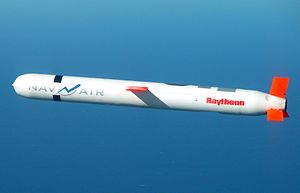
Without booster: 18Â ft 3Â in (5.56Â m)
Block II TLAM-A – 1,350 nmi (1,550 mi; 2,500 km) Block III TLAM-C, Block IV TLAM-E – 900 nmi (1,000 mi; 1,700 km)
The Tomahawk (US /ˈtÉ‘ËmÉ™hÉ”Ëk/ or UK /ˈtÉ’mÉ™hÉ”Ëk/) is a long-range, all-weather, subsonic cruise missile named after the Native American axe. Introduced by McDonnell Douglas in the 1970s, it was initially designed as a medium to long-range, low-altitude missile that could be launched from a surface platform. It has been improved several times, and after corporate divestitures and acquisitions, is now made by Raytheon. Some Tomahawks were also manufactured by General Dynamics (now Boeing Defense, Space & Security).
The Tomahawk missile family consists of a number of subsonic, jet engine-powered missiles designed to attack a variety of surface targets. Although a number of launch platforms have been deployed or envisaged, only sea (both surface ship and submarine) launched variants are currently in service. Tomahawk has a modular design, allowing a wide variety of warhead, guidance, and range capabilities. The Tomahawk project was originally awarded to Applied Physics Laboratory in Laurel, Maryland by the US Navy. James H. Walker (ME Kansas State 1942) led a team of scientists to design and build this new long range missile. The original design with advanced technology is still used today.